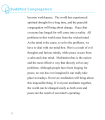wholesome thoughts : ค้นหาหนังสือธรรมะ
หน้าหนังสือทั้งหมด

94
Understanding Merit and Demerit: The Law of Karma
The opposite of merit is demerit, or ‘sin’. Demerit is the product of bad deeds. Bad deeds cause ‘bad karma’. Demerit is a negative energy that is created when a bad deed is performed: mentally, bodil
The opposite of merit is demerit, representing the consequences of bad deeds which cause negative karma. Both good and bad deeds are governed by the Law of Karma, where actions determine outcomes in t

36
TEN RIGHT VIEWS: A Path to Generosity and Understanding Kamma
TEN RIGHT VIEWS
1) Generosity Bears Fruit
The first step of your training is learning to give up something of which you have more than you need and to give to someone whom you love or for whom you car
This text outlines the ten right views that promote a deeper understanding of generosity, respect, and the consequences of one's actions in light of Kamma. Starting with generosity, it emphasizes the

8
Understanding Mental Purities and Wholesome Actions
impurities; defilements; mental impurities
monk’s living quarters
virtue; virtuous; wholesome; good
wholesome action; beneficial act; virtuous deed; good deed
tenfold wholesome course of actio
This text delves into the Buddhist understanding of mental impurities and their impact on virtue and wholesome actions. It discusses the importance of defilements and how monks aim to foster virtuous

60
Dhammakaya Knowledge: The Five Aspects of Natural Law
The Dhammakaya Knowledge (Vijja10 Dhammakaya) is a profound knowledge that deals with the ‘Five Aspects of Natural Law’, the Law that governs all things. They include Biological Law, which governs all
The Dhammakaya Knowledge (Vijja10 Dhammakaya) focuses on the Five Aspects of Natural Law, including Biological, Chemical, Psychic, Karmic Laws, and the Law of Cause and Effect. This knowledge reveals

188
The Sacred Formula for Success in Meditation
…ure and tranquil, brightness will arise naturally. The mind’s clarity will increase and bring about wholesome thoughts. They will clearly see the wholesome means to perform more merit.
Thus, the third sacred formula i…
… dedication. As individuals practice meditation, they purify their minds, leading to brightness and wholesome thoughts. The third sacred formula emphasizes the frequency of meditation practice as a pathway to success. …

122
Understanding Wholesome and Unwholesome Actions
as animals, or born into bad places. There are various levels of these: (1) born as an animal (and that includes ANY animal), (2) born as a Hungry Ghost, (3) born as a monster, (4) Go to one of the va
In this text, the author discusses the consequences of actions in life, emphasizing the importance of wholesome practices such as sharing, charity, encouragement, and recognizing the results of both g

57
Raising Children: Building Good Habits
Part Two: Raising Children
In order to develop good habits, we must understand two
things:
(1) Heredity plays an important part in developing
virtuous habits. If the parents practice good habits,
even
In nurturing children, both heredity and environment play crucial roles in developing good habits. Parents should embody virtuous behaviors even before conception and continue these practices post-bir

61
Understanding Defilements and the Path to True Happiness
"• In conclusion, the sufferings of all beings are caused by succumbing to the influence of our accumulated defilements - from the past until this moment. We open our eyes (all of our senses are open)
In conclusion, suffering arises from our defilements, which influence our actions and desires. To achieve true happiness, we must eliminate these defilements through good actions, stopping poor habits

17
The Transformative Power of Meditation
The key difference between a mind under the sway of thoughts and the mind that has come to standstill is that the latter consumes virtually no metabolic energy. When your mind starts to come to rest i
The key difference between an active and still mind is energy consumption—less energy leads to reduced thoughts and breath. As the mind quiets, inner brightness emerges, enabling objective understandi

53
The Origins of Children's Habits
Where do Children's Habits come from?
After parents learn that good children must not be
troublesome, ignorant, or careless towards others, the question
now is, how do parents cultivate these traits i
Children's habits stem from the repetitive actions, thoughts, and speech they engage in, heavily influenced by their parents. If children are exposed to unwholesome behaviors, they may develop bad hab

28
DhaKma: Your Path to Self-Reliance and Prosperity
DHAKMA IS YOUR REFUGE
I see all the way through. I see clearly that, out of everything in this world and beyond-physical, natural, and spiritual- no one can help me but me.
Who else can relieve my suf
…pportunity for spiritual growth, aiming to make the most significant merit possible. By focusing on wholesome thoughts and actions, anyone can transform their existence.

171
Cultivating Mindfulness and Moral Foundations in Families
their families to have control over themselves at a young age,
the grandparents instilled them with generosity through alms
offerings to the monks and daily observance of the five
precepts. These whol
This text discusses how families can instill moral values and mindfulness in children through daily Dhamma studies, teachings, and meditation. It emphasizes the importance of generosity, the awareness

188
Glossary of Buddhist Terms
Part Seven: Appendixes
Kamma (Sanskrit: Karma): neutral word meaning action
with intention; action
Khanti: endurance
Kilesa (also spelled Gilesa): the impure element to our
mind; i. e. passion, lust,
This glossary provides definitions for essential Buddhist vocabulary, including terms like Kamma, which refers to actions with intention, and Nibbana, the ultimate state of understanding. It discusses

30
The Power of Meditation for World Peace
Buddhist Congregation
become world-peace. The world has experienced
spiritual drought for a long time, and the peaceful
congregation will bring about change. Peace that
everyone has longed for will co
In a world beset by spiritual drought, the Buddhist congregation advocates for the power of meditation as a solution to achieve world peace. Problems are rooted in the wicked mind, and to achieve peac

55
Meditation and Its Impact on Love and Family
Love and Family
I have tried meditating before, using many
other techniques. But I feel that the Dhammakaya
technique is best suited for me. I like the way that I
don't have to do anything more to att
Through practicing the Dhammakaya meditation, the author shares how their relationship with their spouse has deepened, marked by daily chanting and mindful meditation. The technique aids in clearing n

200
Finding Your Mind: A Journey to Inner Calm
Finding your mind is not a difficult task
Comfortably lean up against the back of a chair and gently close your eyes. Yes, right. You are feeling all your thoughts passing through your mind one after
Finding your mind is a process of calming your thoughts and focusing on one at a time. By leaning back, closing your eyes, and acknowledging your waves of thoughts, you can begin to arrange mental pri

102
Understanding the Right Way to Achieve Relaxation
How Do You Know Whether You’re Doing It the Right Way?
If you’re doing it the right way according to the right Knowledge (Vijja), your body will feel relaxed and at ease. Your mind will also feel rel
In achieving relaxation, if done correctly according to the right knowledge (Vijja), both body and mind will feel at ease. Initial feelings of contentment evolve into a lighter, more spacious existenc

49
Understanding the Eightfold Path in Buddhism
Suzanne Jeffrey
"The path begins with Right View, Samma-Ditthi. This is also called Right Understand-
ing. On one level, this means that we understand that there is cause and effect: that do-
ing goo
The text outlines the initial parts of the Eightfold Path in Buddhism, emphasizing the importance of Right View, which differentiates good and bad actions based on cause and effect. Right Intention is

60
Understanding the Mind and Defilements
Suzanne Jeffrey
the body will die. (4) It likes to travel fast and far. The speed of light is 186,000 miles a second, so it takes 8 minutes to see from the earth to the sun. But our mind perceives th
This text delves into the complexities of the human mind, emphasizing its speed and difficulty to control. It discusses how meditation can help in training the mind, which is often distracted by defil

112
The Path to Merit and Positive Mindset
178. ONLY MERIT IN MIND
If you come to the temple for the sole purpose of gaining merit, then you are on the right path and you will never fall into misfortune. On the other hand, if you come here to
เนื้อหาเน้นที่การมาที่วัดเพื่อสะสมคุณธรรมและหลีกเลี่ยงความทุกข์ ความคิดที่เป็นบวก มุ่งมั่นที่จะอยู่ห่างจากความคิดลบ การตรวจสอบตนเอง และเส้นทางสู่การดับทุกข์และหาความสุข การค้นพบพระธรรมและการทำสมาธิจะช
